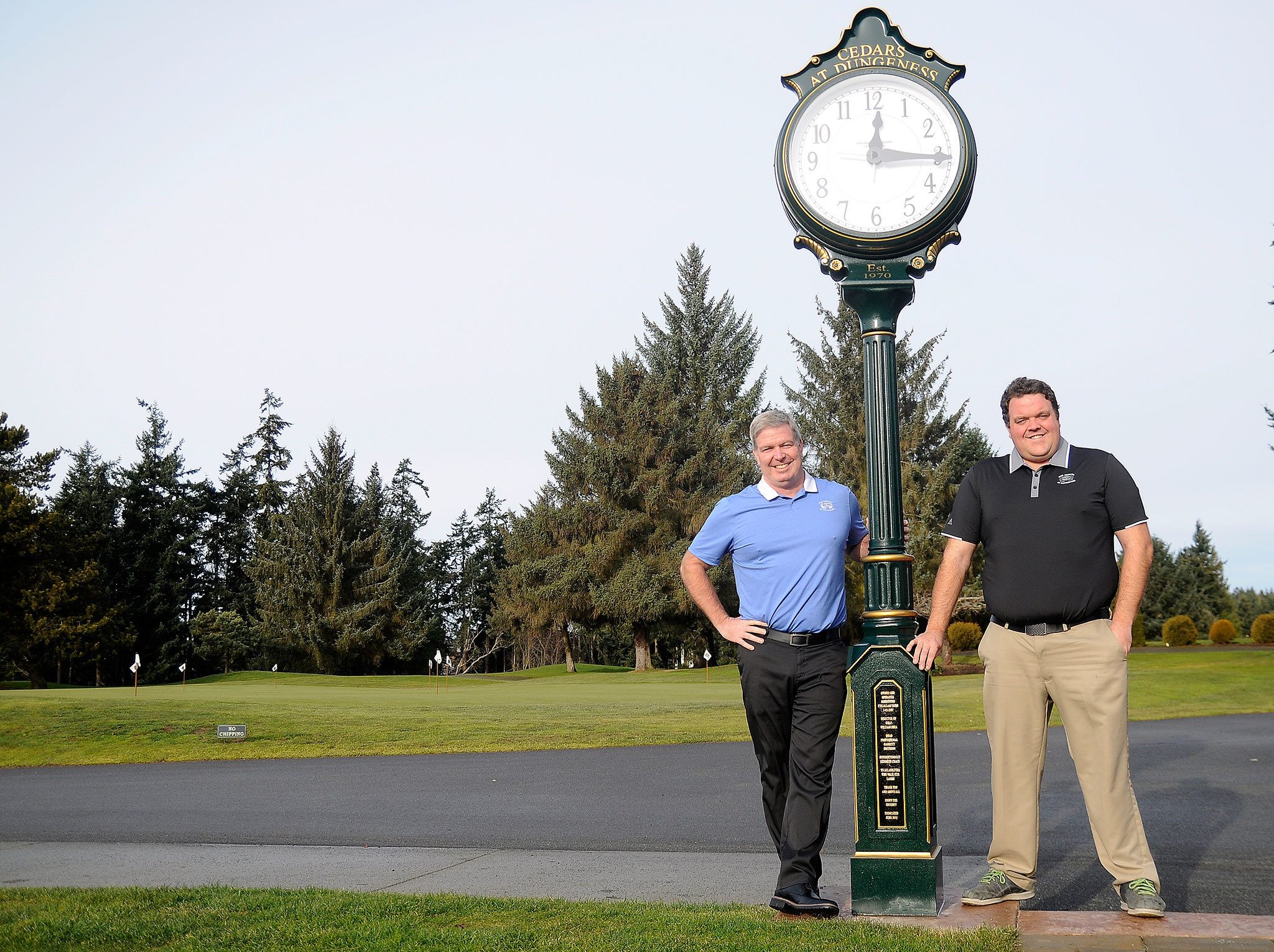The Cedars at Dungeness
18-hole, par 72 golf course
Location: 1965 Woodcock Road
On the web: www.7cedarsresort.com/golf
Phone: 683-6344
While some employees might be unnerved by the prospect of new ownership, golf pros Bill Shea and Garrett Smithson say they were rather excited when Dungeness Golf Course changed hands in late 2006.
The two have had some time to reflect on a number of changes as The Cedars at Dungeness celebrates 10 years of operation under the Jamestown S’Klallam Tribe’s 7 Cedars Casino.
“Amazing; it’s been such a whirlwind,” says Shea, general manager and director of golf at The Cedars.
“I knew the relationship with (7 Cedars CEO) Jerry Allen, the friendship, was there,” Shea recalls. “There was trust already built in. We felt comfortable moving forward. All these guys, they’ve been playing golf (here) for 40 years.”
“I know we were all excited; I was all in,” says Smithson, head golf pro at The Cedars who had worked for the tribe for eight years prior to the changeover, since he was a sophomore in high school.
Designed and built in 1969 and opened in 1970, the 122-acre Sequim course has become a top spot not just for local golfers but across Western Washington. Featuring more than 6,400 yards (men’s tees) over 18 holes, The Cedars is playable for about 300 days per year.
That kind of word-of-mouth helps promote the course to I-5 corridor players, Shea says.
The Cedars was voted Best Golf Course in KING-5 “Evening Magazine’s” Best NW Escapes four years in a row.
“We get a significant amount of business from the other side (of Puget Sound),” he says.
The Cedars at Dungeness keeps busy to the tune of 125 tournaments per year — parties of 16-plus are considered tournaments, Shea says, with two- or three-day events counting as one tourney — and about 40,000 rounds of golf annually.
“We take pride in that. We’re doing numbers city courses are doing,” Smithson says.
The course is a popular spot for junior and senior tourneys alike, plus fundraisers such as the annual Sonny Sixkiller Golf Classic that raises dollars for the Olympic Medical Center Foundation.
The transition a decade ago came relatively smoothly, Shea says, but has brought some big changes.
“In this building (with the pro shop, banquet hall, restaurant and bar) alone, I don’t think there’s a single inch that’s the same,” Shea says.
Shea says The Cedars may be the first tribe casino-owned course in the state, setting a trend that would be repeated across Washington: White Horse Golf Club in Kingston/Suquamish Indian Tribe, 2010; Salish Cliffs Golf Club in Shelton/Squaxin Island Tribe, 2011; Kalispel Golf and Country Club in Spokane/Kalispel Tribe, 2015; and Swinomish Golf Links in Anacortes/Swinomish Tribe, 2013.
Through 2016, the course was owned by five Seattle-area investors. When talks began in earnest late that year and eventually solidified, Shea was promoted to general manager, Jeff Lindsey was promoted from first assistant professional to head professional and Smithson from second assistant pro to first assistant pro. Chad Wagner, recently named head pro at Port Angeles’ Peninsula Golf Club, had graduated high school recently and was working cart detail.
Since the announcement of the prospective sale came a couple of months before the changeover, Shea says staff had time to adjust. Most staffers stayed on, he says.
A key move by Allen and other managers was to embrace employees, letting management and staffers know their jobs were secure, Shea said.
“They got the employees behind them,” he said.
Then came the changes: new golf carts, new maintenance equipment such as course mowers, added benefits for employees and eventually, major remodels for the pro shop and food service area — “all the necessary tools for success,” Shea said.
The golf course layout has stayed fairly static over the past decade, Shea says, other than two redesigned greens and some added bunkers. What’s changed is a bit of stylistic features, from changing signage at the holes to renaming the holes themselves.
The logo for the course changed to a Salish crab and perhaps the most obvious change came to the course name, The Cedars at Dungeness — carrying over the Dungeness name and marrying it with the 7 Cedars Casino ownership.
“I think the idea was to bring in the tribal theme without being in your face,” Shea says.
“It was not just bringing in a ‘tribal feel’ but the philosophy: Everything they build is (built to last) for 100 years. That’s why everything out here is done to perfection. They want something their ancestors will be proud of.”
A second key to success on the course, Shea says, is more internal and less obvious for the casual golfer or restaurant-goer. The new owners created a customer service program that elevated how well The Cedars staff treats guests, Shea says.
And the changes continue, the two say, as 7 Cedars looks to keep the course and the amenities fresh and new. Hence, a monthlong remodel of the bar/restaurant in January (see side).
“People come in year after year and say, ‘You guys did it again,’” Smithson says. “They notice.”
Shea says The Cedars plans to host a grand reopening of the food service area to coincide with a 10-year celebration sometime in March.
“We’ve had a lot of fun out here the last 10 years,” Smithson says.
Remodel at The Cedars
The Cedars at Dungeness restaurant is to close for up to eight weeks for a major kitchen remodel. The Double Eagle, Stymie’s and the Legends Room all will be closed into February; contact food and beverage manager Matt Eveland at meveland@7cedarsresort.com for more information.
Bill Shea, general manager and director of golf at The Cedars, said the remodel was needed as The Cedars’ regular food service, specialty dinners and catering business continue to grow. “The kitchen can’t keep up with the pace, the number of customers we have,” he says. “Golf operations will still be open.”



